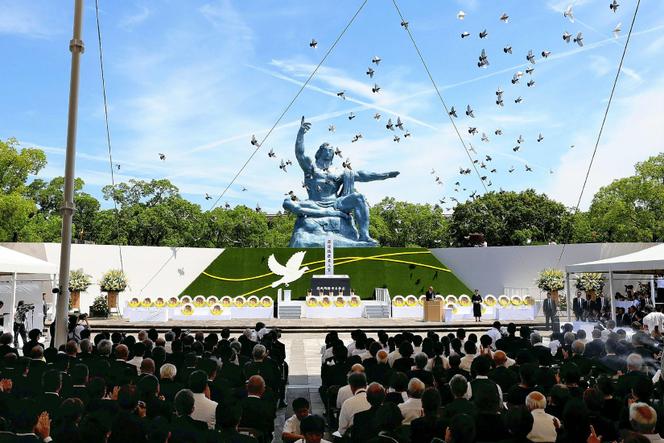


The ceremony held in Nagasaki on Friday, August 9 to commemorate the 1945 atomic bombing by the United States has taken a political turn. Because of the conflict against Hamas in the Gaza Strip, the city in southwest Japan refused to invite Israel, unlike Hiroshima, which held its commemorations on August 6. Deploring a "politicization" of the ceremony, G7 countries (excluding Japan) and the European Union declined to send their ambassadors.
The conflict was addressed by the mayor, Shiro Suzuki, in his traditional declaration for peace. The mayor lamented the "uncertainty about when the Russian invasion of Ukraine will come to an end and growing concern about the expansion of armed conflicts in the Middle East," and said that "we are currently facing a critical situation with the increased likelihood of the disappearance of the important norm that we have conformed to thus far," namely, "never using a nuclear weapon again." His speech in the sweltering heat of Peace Park was punctuated by verses by the poet Sumako Fukuda (1922-1974) a bomb survivor and anti-nuclear activist.
The solemnity of the occasion overshadowed the controversy surrounding the preparations for the ceremony. The non-invitation of Israel had been raised by Suzuki as early as June. He made it official on July 31, saying it was based on a hope for a "ceremony conducted smoothly under a solemn atmosphere." The mayor denied any political motivation: "August 9 is the most important day of the year for the city of Nagasaki. The average age of survivors is now over 85," explained the son of hibakushas (survivors). At the same time, Nagasaki invited the Palestinian Authority, which "is not a party to the conflict" between Israel and Hamas.
The memory of the 1945 atomic bombings, which killed 140,000 people in Hiroshima and 74,000 in Nagasaki, fuels a powerful pacifist current in both cities. For months, the hibakushas had been pleading for Israel not to be invited to the commemorations. Both cities were the scene of demonstrations in support of Gaza. The Japanese press was critical of Israel's attitude. Hiroshima chose to invite Israel so that it could hear live the traditional declaration for peace, which this year included criticism of the conflict in Gaza.
Nagasaki's decision was described as "regrettable" by Israel's ambassador, Gilad Cohen. The Simon Wiesenthal Center's director for global social action, Abraham Cooper, saw the move "insults the memory of 1,200 Israelis mass murdered on Oct 7th by Iran-backed Hamas terrorists."
You have 50.32% of this article left to read. The rest is for subscribers only.
